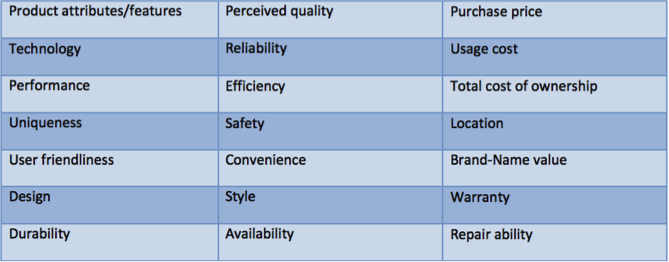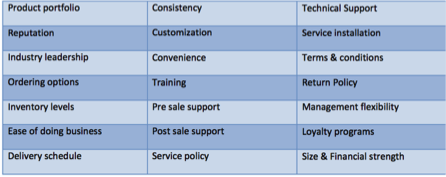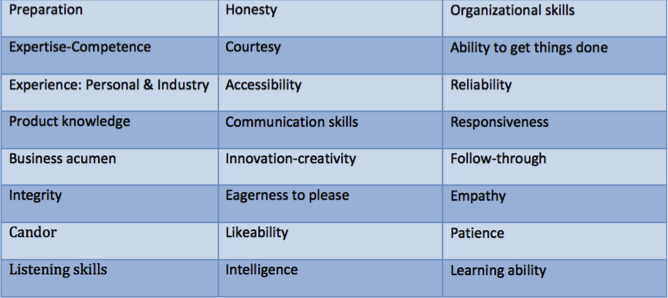To differentiate is to stand out in a crowded field and to be different in a way that is meaningful to each individual buying influence. Without differentiation the status quo looks pretty good and there is no reason to consider your product, service or solution.
Differentiation prevents the buyer from commoditizing you even when they perceive you are selling a commodity. Our definition of a commodity is any product or service that is sold by multiple firms with no perceived difference in quality. If you and your competitors are viewed as a commodity the buyer will choose one vendor over another based on price, terms and/or conditions.
A savvy sales representative can differentiate:
- Their product
- Their company
- Themselves
Differentiating your Product
Sales professionals can differentiate their product in many different ways (see table1).

Note: These are just a few examples and are not meant to be an exhaustive list.
Within healthcare sales the most common methods of differentiation are through product attributes, service, quality and/or price.
When a product differentiation approach is used, the sales professional illustrates the distinct differences of the product versus the competitors offering. This works well with individuals who will use or supervise the use of the product but it does not necessarily resonate with whoever is going to authorize the expenditure of funds. Oftentimes, it’s also a short-term advantage because competitors quickly copy the different feature and offer it as well.
When quality is used as a means of differentiation the sales professional often discusses the length of the product’s warranty over the competition thus implying the product is better designed and will require less maintenance and repair. If it’s an existing product, savvy sales professionals often tout the product track record of run-time without problems. This message resonates well with clinical personnel, clinical engineering and materials management.
Price differentiation is the least desirable option because it can rarely be sustained. There is always at least one competitor that is willing to come in at a lower price than you. Furthermore, buyers that focus primarily on price are commoditizing you. Since they see no inherent value in your product or service it’s very difficult to develop a meaningful relationship and protect the business long-term.
Today’s healthcare buyer demands value which we define as proven quality divided by cost. Value is demonstrated through improved clinical outcomes, cost effectiveness, cost avoidance or revenue enhancement. This is what matters to them as you describe your value in terms that are meaningful and that will resonate with them. Your differentiation has to be in terms that they understand.
Differentiating your Company
Sales professionals can also differentiate their company to gain competitive leverage (see Table2).

Note: These are just a few examples and are not meant to be an exhaustive list.
Company differentiation within healthcare manufacturers is often based upon their overall size and financial strength; industry leadership as demonstrated by their depth and breadth of their product portfolio, innovation history and patented technology; plus the company’s pre-sale and post sale support.
Healthcare providers tend to focus on their location or number of facilities which provides convenience, their reputation for service delivery and consistency.
Differentiating Yourself
Sales professionals comprehend that they are a key component of what the customer is buying so they differentiate themselves (see table 3).
Table 3: Personal Differentiation

Note: These are just a few examples and are not meant to be an exhaustive list.
Sales professionals bring expertise: business acumen and clinical knowledge to every client encounter. They get their clients to see a new reality and a new possibility that is better than their existing state and one that provides a measurable value to their clients.
Expertise is delivered by demonstrating that they understand the healthcare milieu and the plethora of changes that are occurring within it. This requires a process of continuous learning and mastery before it can be discussed intelligently with all of the various buying influences within a hospital, IDN or ACO.
Expertise without proper planning is foolishness. Savvy professionals thoroughly prepare before every client encounter. They leave nothing to chance. To be a game changer means they must always be at the top of their game. Top performers know that they often must change the “status quo” and this requires thinking through in advance what questions they will ask, be asked and what information they will provide during an upcoming meeting. They differentiate themselves from their competition through their preparation and execution.
It is what separates them from their competitors. Make no mistake. People buy from people who they like and respect; and people they believe and trust can provide them measurable value today and tomorrow. In every sales encounter you must provide personal value to distinguish yourself from your competition.
Unfortunately if you do not have a relationship with your buyer(s) it takes time for these strengths and personal attributes to be recognized, acknowledged and appreciated.
Parting Thoughts!
Differentiation can be accomplished in many different ways. Do not be afraid to be innovative in your approach to differentiate yourself. To be effective you must be relevant and meaningful to each individual buying influence. As you engage with each stakeholder as they proceed through the buying process constantly think about how you will provide meaningful and measurable differentiation. Your differentiation has to be clearly articulated so that it resonates with each buying influence and allows them to clearly see why you, your company or your product is meaningful. Stand out in a positive way, be persistent and earn the business.


